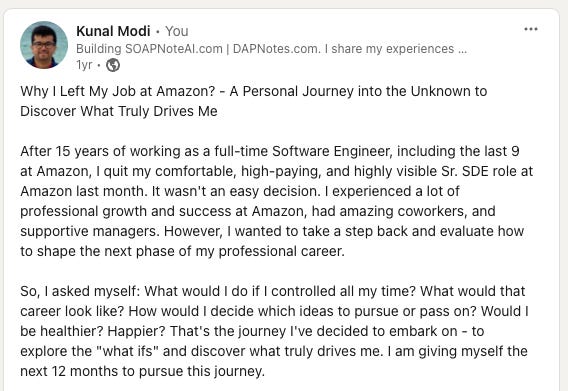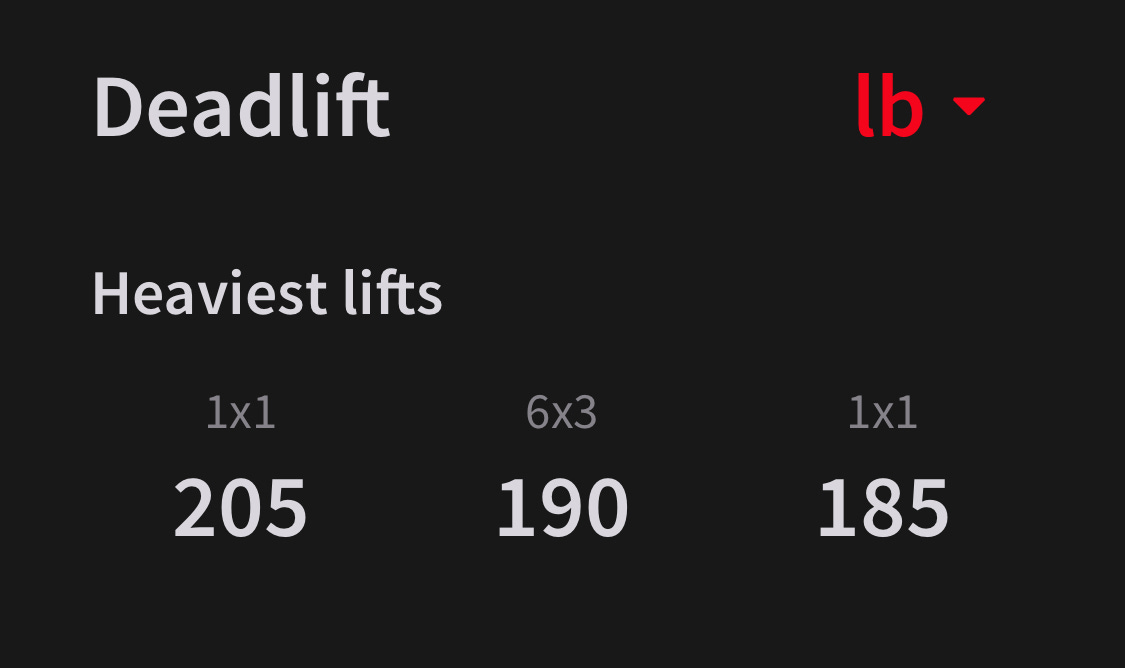Quitting Your 9-5 Job in 2024?
Practical Insights from My 1-Year Journey
Are you considering leaving your 9-5 job to find out what else is out there for you? I was in your shoes last year. After spending over 15 years working in the corporate world, I realized I needed a change. Not because I disliked my job, but because I wondered if there was more to my career than the traditional path I was on.
This past year without a 9-5 job has been an eye-opener. I didn't leave to start a billion-dollar venture but to understand what really drives me and how I could make a living on my terms. It's been a year of experiments, some successes, and plenty of learning moments.
If you are thinking about making a similar change but aren't sure how to start or what to expect, this post is for you. I will share the realities of leaving a stable job, the preparations I wish I knew about, and the insights I have gained along the way.
The Dos’
1. Write down your Motivation - Why do you plan to quit your job?
Understanding the motivation behind quitting your job is crucial. During my corporate career of 15 years, the thought of quitting a full-time job crossed my mind innumerable times. Often, it was inspired by reading success stories of people who “made it” (e.g., unicorn founders, lists like 30 under 30s) and yearning to replicate that success for myself before there are no more lists I can be part of. Sometimes, it stemmed from dissatisfaction at work. For example, back in 2010, I was changing 1-2 lines of code per day and watching paint dry the remaining time during my role at J.P. Morgan. Moving to a new company and role fixed that. Few times slow career growth, work politics and delayed promotions also pushed me towards towards starting my own journey. I am glad I didn’t then.
When I decided to take the plunge, I found myself yearning for freedom to explore my passions, innovate on my terms, and truly own my own successes and failures. This yearning wasn't about dissatisfaction with my job but a call towards something inherently more fulfilling - creating value on my own and for myself. It was about taking control of my time, projects, and, ultimately, my life's direction.
Understanding this “why” is fundamental because it fuels the perseverance needed when faced with the inevitable challenges of forging a new path. It's this underlying motivation that keeps you anchored, ensuring that every step taken is a step towards realizing your true potential. Write down this “why” somewhere. I wrote it here.
2. Preparation
You don’t need a business plan . That may cause you to overthink and delay. Allow your journey to unfold by itself. But personal financial planning is essential. For example you should calculate your “personal runway” by estimating your living expenses for the next 12 months without any income. Being conservative, especially since we have a family with 2 young kids, I recommend having at least twice your annual expenses saved. For instance, if your yearly expenses are $100,000, aim to have at least $200,000 saved to cushion against unforeseen challenges.
If you live in the US, make sure you account for health insurance coverage. Employer COBRA plans are usually very expensive. Thankfully in 2024, we have moved to a healthcare.gov marketplace plan which has reduced the premiums to about $1,300/month.
If your spouse’s employer offers healthcare plans then compare those with what healthcare.gov offers. Feel free to reach out to me if you have any specific questions.
Emotional preparedness is just as important as financial planning. The ride is no less exhilarating than a real roller-coaster. It also includes patches of self-doubt and uncertainty. For example there are instances when days passed by without my apps making any sales. These are the times when you need to be the most resilient and keep forging your path. Being emotionally prepared means acknowledging the challenges ahead while creating a mindset that embraces both successes and setbacks as part of the journey.
3. Start Small - Experiment, Learn and Iterate
The likelihood that your single idea—be it an app, book, course, Amazon/Shopify store, etc.—will succeed is slim. You will need to explore many ideas, fail quickly, and learn from those failures. This process will lead to your first small victory, and the insights gained will pave the way for even greater successes. I advise against aiming too high from the start. Focus instead on earning your first dollar, then the next thousand, and so on. If you are fortunate enough to find something that works well, double down on that idea.
For me, PlaylistGeniusAI.com earned me my first dollar and my first thousand, boosting my confidence to launch more apps. SOAPNoteAI and DAPNotes continue to generate revenue with 100s of paid customers around the world, whereas other projects like ReviewHeroAI.com, IdliCooker.com, and LLMFineTuner.com did not bring in any money. It is okay to abandon ideas that don’t work.
4. Maintain a Learning Mindset
Throughout my career, I have been fortunate to work with high-performing colleagues, which has significantly contributed to my growth. I was concerned that leaving such an environment would hinder my development and lead to stagnation. However, my experience over the past year proved otherwise. Engaging with various communities (e.g., Small Bets) and leveraging social media platforms (primarily X and YouTube), I have acquired diverse skills that I would never have gained in a corporate setting. For instance, I learned how to price my products, including strategies like one-time payments, subscriptions, and tiered plans. I also discovered how to attract my first paying customer. The online world is full of amazing individuals openly sharing their expertise, and adopting a continuous learning mindset allows you to benefit from this wealth of knowledge. Check out this tweet to follow interesting people sharing their learnings online.
Apart from core skills, staying humble is equally important if not more. Your past corporate laurels and expertise won't get you the same respect in the public domain. Be humble and reestablish your authority and expertise.
The Don’ts
1. Waiting for the Unique Idea
Ideas are overrated. Don’t be disheartened if you do not have the next million/billion-dollar idea. Start with a boring or existing idea but execute it well. In the long term, well-executed ideas outlast unique ones. The realization that launching early and iterating is more valuable than waiting to perfect an idea. Check out @staticmaker1’s feed to get inspired on how many boring and simple ideas make significant money.
Following the same principle, waiting for perfection is an ineffective strategy. If you have an idea, dedicate a limited amount of time to releasing the first iteration of your product to the public. It's acceptable for some of your workflows to be manual initially. Once your product begins to gain traction, you can invest time in automating those workflows. For instance, in late December, a customer requested a monthly unlimited plan for SOAPNoteAI. Automating subscription plans requires considerable technical effort, and I wasn't certain if there would be more interest. Within the next 20 minutes, I created a subscription product using the Stripe payment portal, sent the link to the customer, and updated the website.
The following month, 10 more customers signed up for the subscription plan. It's only now that I am automating the workflow because I have sufficient data to confirm the demand.
2. Waiting for the Right Time
There will never be a "right time" to give yourself a chance. I used to believe the best time to take risks and chances on myself was when I was single and in my early 20s. Life, however, had other plans. I focused on building a career, saving money, getting married, and starting a family. But the assumption that this path would limit my opportunities for risk-taking and personal ventures couldn't have been more wrong. At 37, married with two young kids, I find myself equally excited and energetic to work on my own ideas and terms. Admittedly, you have more responsibilities, but these responsibilities enhance accountability in your decisions. In fact, a supportive family turns out to be your greatest asset. The right time is the moment you decide to start.
3. Ignoring Personal Well-being
One of the side effects of a 9-5 job is that it comes with a default schedule built around your work hours. When I transitioned to working for myself, the absence of predefined work hours underscored the importance of establishing a new routine. I discovered that my most productive working hours are between 10 am and 2 pm every day, with the morning ritual of dropping my kids off at school providing a structured start. Additionally, I make deliberate efforts to leave my home, whether for a walk or to visit the gym.
Starting to lift weights and eating clean keeps me refreshed and sane.
Over the past year, I have cultivated social connections through online platforms with others pursuing similar journeys. Exchanging ideas, giving feedback, share successes, and challenges with this cohort has become an essential part of my well-being.
Reflections and Looking Ahead
This past year has been an incredible journey of personal growth and discovery, significantly boosting my confidence and helping me uncover what truly motivates me: the freedom to create, explore, and make an impact on my own terms. While this journey has brought a great deal of fulfillment, I have yet to reach my financial milestone. For instance, I have not yet achieved my goal of $10,000 / month in revenue, but I am steadily making progress towards it. I aim to reach this target by the end of this year. I believe achieving both financial success and personal fulfillment is the holy grail of success in this journey.
Until then, it's back to building, learning, and iterating.
Thank you for supporting me throughout this journey.
I read and respond to all the comments. Let me know if you are reading this.
Can I help you? Reach me out on X, LinkedIn, reply or leave a comment on this post.
Know someone who can benefit from this post, please share it.












Great ready my Friend!
The checklist is very useful for me.
Diversifying into real estate will be the path for me.
It will also greatly accelerate the process once my wife goes back to work.
Nice post Kunal. Very insightful!